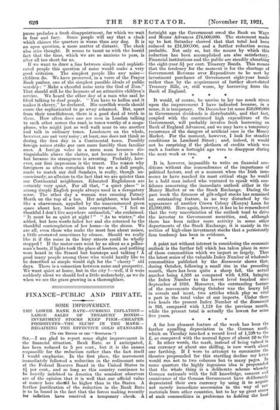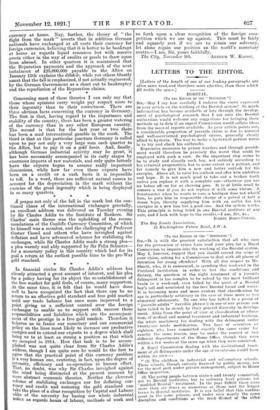FINANCE—PUBLIC AND PRIVATE.
SOME IMPROVEMENT.
THE LOWER BANK .RATE--CURBING INFLATION— LARGE SALES OF TREASURY BONDS— INVESTMENT STOCKS KEEP FIRM—CHEAPER FOODSTUFFS—THE SLUMP IN THE MARK— REGAINING THE EFFECTIVE GOLD STANDARD.
[To TUE EDITOR. or TAE " SPECTATOR."] SIR, I am glad to report some slight improvement in the financial, situation. Bank Rate, as I anticipated, has been reduced to 5 per cent., but it is the causes responsible for the reduction rather than the fact itself I would emphasize. In the first place, the movement immediately followed a reduction in the rediscount rate of the Federal Reserve Board in the United States to 4i per cent., and so long as this country continues to be heavily indebted to America the soundest" observers are of the opinion that it is well that our official value of money here should be higher than in the States. A further justification of the reduction in the Bank Rate is to be found in the fact that the forces making recently for inflation have received a temporary - check. A fortnight ago the Government owed the Bank on Way! and Means Advances £74,000,000. The statement made up to last Saturday showed that that total. had been reduced to /24,500,000, and a further reduction seems probable. Not only so, but the means by which this reduction has been accomplished are also satisfactory. Financial institutions and the public are steadily absorbing the eight-year .51- per cent. Treasury Bonds. This means that the tendency for the moment is for the shortage of Government Revenue over Expenditure to be met by investment purchases of Government eight-year bonds rather than by the acquirement of further short-dated Treasury Bills, or, still worse, by borrowing from the Bank of England. * * It would, of course, be unwise to lay too much stress upon the improvement I have indicated because, in a sense, it is temporary. On December 1st some £50,000,000 in Government dividends is distributable, and that fact, coupled with the continued high expenditure of the Government, will probably involve fresh borrowing on Bank of England Advances, and we may have a temporary recurrence of the dangers of artificial ease in the Money Market. For the moment, however, I look for steadier conditions in Lombard Street ; and, indeed, it would not be surprising if the plethora of credits which was such a feature a fortnight ago were to disappear during the next week or two.
It is, however, impossible to write on financial con- ditions 'without due remembrance of 'the importance of political factors, and at a moment when the Irish issue seems to have reached its most critical stage he would be a bold man indeed who ventured to speak with con- fidence concerning the immediate outlook either in the Money Market or on the Stock Exchange During the past week the firmness of gilt-edged stocks has remained an outstanding feature, in no way disturbed by the appearance of another Crown Colony (Kenya) Loan for £5,000,000. Here again, however, it has to be remembered that the very uncertainties of the outlook tend to drive the investor to Government securities, and, although there has been rather more activity in some other departments of the Stock. Exchange, it is mainly in the section of high-class investment stocks that a persistently firm tendency- has been in evidence. * * * A point not without interest in considering the economic outlook is the further fall which has taken -place in some of those commodities which we import so largely. Thus the latest series of the valuable Index Number of wholesale commodities published by the Economist shows that, during October, following a small rise in the preceding month, there has been quite a sharp fall, 'the actual number being 4,588 as compared with 4,924, bringing the Index Number to the lowest level touched since September of 1916. Moreover, the -outstanding feature of the movements during October was the heavy fall in cereals and meat, two articles which play so vital a part in the total value of our imports. Under these two heads the present Index Number of the Economist is 956, compared with 1,119 for the previous month, while the present' total is actually the lowest for some five years. * * * A far less pleasant feature of the week has been the further appalling depreciation in the German mark, which on Tuesday touched a record level of 1,256to the E, as compared with the normal figure of about CO to the E. In other -words, the mark, instead of being valued in our currency at about one shilling, is now worth about one farthing. If I were -to attempt to summarize the theories propounded for this startling decline my letter would ran not to two columns but to many pages. In some quarters the highly ingenious idea is propounded that the whole thing is a deliberate scheme whereby German nationals with the full knowledge, consent and connivance of the German Government have deliberately depreciated 'their own currency by using it to acquiN not merely immediate necessaries in the way of raw materials from other countries, but to lay up great stores of such commodities in preference to holding .the local currency at home. Nay, further, the theory of " the flight from the mark " asserts that in addition German nationals have exchanged at all costs their currency for foreign currencies, believing that it is better to be bankrupt at home as regards liquid resources but with reserve assets either in the .way of credits or goods to draw upon from abroad. In other quarters it is maintained that the Reparation payments and the approach of the next instalment of £25,000,000 payable to the Allies on January 15th explains the debacle, while yet others bluntly assert that the fall is emphasized, if not actually engineered, by the German Government as a short cut to bankruptcy and the repudiation of the Reparation claims. * * * Concerning most of these theories I can only say that those whose opinions carry weight pay respect more to their ingenuity than to their correctness. There are three obvious facts concerning the currency in Germany. The first is that, having regard to the importance and stability of the country, there has been a greater watering of the currency than in any other European country. The second is that for the last year or two there has been a mad international gamble in the mark. The third is that at this particular juncture Germany is called upon to pay not only a very large sum each quarter to the Allies, but to pay it on a gold basis. And, finally, although German industrial activity may be great, it has been necessarily accompanied in its early stages by enormous imports of raw materials, and only quite latterly have the exports begun to assume really important dimensions, while how far even these exports have been on a credit or a cash basis it is impossible to tell. , In a word, there are sufficient natural causes to account for the depreciation in the mark without the exercise of the great ingenuity which is being displayed in so many quarters. * * A propos not only of the fall in the mark but the con- tinued chaos of the international exchanges generally, an excellent address was delivered on Tuesday evening by Sir Charles Addis to the Institute of Bankers. Sir Charles' main theme was the upholding of the recom- mendations of the Cunliffe Currency Committee, of which he himself was a member, and the challenging of Professor Gustav Cassel and othens who have inveighed against deflation and have advocated schemes for stabilizing the exchanges, while Sir Charles Addis made a strong plea— a plea warmly and ably supported by Sir Felix Schuster— for a monetary policy in this country which had for its goal a return at the earliest possible time to the pre-War gold standard.
* * * In financial circles Sir Charles Addis's address has already attracted a great amount of interest, and his plea for a policy having for its object the re-establishment of the free market for gold finds, of course, many supporters. At the same time, it is felt that he would have done well to have recognized the fact that there can be no return to an effective gold standard and free gold market until our trade balance has once more improved to a point giving us a sufficient control over the foreign exchanges to enable us 'to' support with success those responsibilities and liabilities which are the accompani- ment of the prestige in a free gold market. Therefore it behoves us. to frame our monetary and our commercial policy on the lines most likely to increase our productive energies and to extend our exports to a degree which shall bring us to at least as strong a position as that which We occupied in 1914. How that task is to be accom- plished was not quite clear from Sir Charles Addis's address, though I am quite sure he would be the first to agree that the practical point of this currency problem Is a very human one, centering, in fact, upon the degree of intensity, efficiency and co-operation in human effort. That, no doubt, was why Sir Charles inveighed against the mind being distracted at the present moment by mere abstract economic theories. Neither the cleverest scheme of stabilizing exchanges nor for deflating cur- rency and credit and restoring the gold standard can take the place of a clear recognition by Capital and Labour alike of the necessity for basing our whole industrial Palley as regards hours of labour, methods of work and so forth upon a clear recognition of the foreign com- petition which we are up against. This must be fairly and squarely met. if we are to retain our solvency, let alone regain our position as the world's monetary centre.—I am, Sir, yours faithfully,







































 Previous page
Previous page